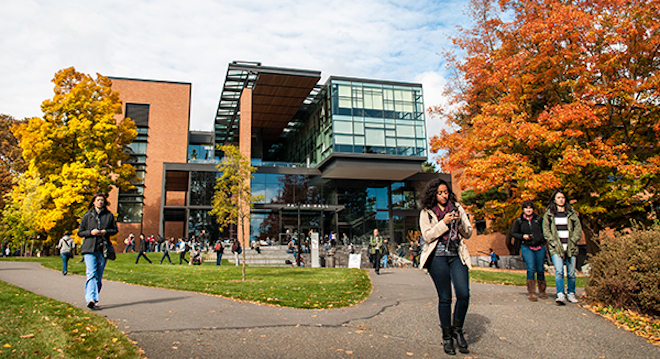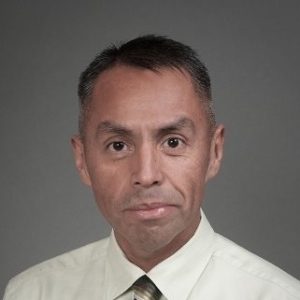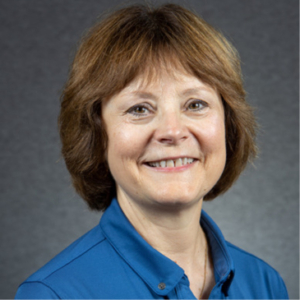
The University of Washington Foster School of Business. File photo
Want to know what sets University of Washington’s Foster School of Business executive MBA apart from its competitors? Think like a realtor: Location, location, location.
“Being positioned in Seattle, especially on the West Coast, our region is very tech focused. There are a lot of tech companies here. I think we have anywhere between 25 to 30% of our students each year who are in the tech sector,” says Randell Hernandez, director of admissions for the Foster EMBA program. “Seattle is also one of the coast’s gateways to Asia. This allows for great, easy access to commerce and learning opportunities in Asia.”
Louise Kapustka, executive director of Foster’s EMBA as well as an alum of the program, agrees.
“Because of Seattle, because of the University of Washington, and frankly, because of the Foster School, we’re also a mecca for great faculty,” she tells Poets&Quants. “We have iconic companies here in town that love to consult with our faculty. It’s critically important in an Executive MBA Program that when a faculty stands up and says, ‘Here’s what’s happening in business,’ that they know what they’re talking about. In our case they do because they’re working with these companies.”
UW FOSTER’S EMBA SPOTLIGHT
Foster’s EMBA program launched in 1983. It now offers two distinct schedules – one that meets for one to two days once per week (typically alternating Fridays and Saturdays), and one that meets for four consecutive days once per month (Wednesdays through Saturdays.) All classes in the program are core curriculum, and it does not offer electives in the schedule. (There are some opportunities to take summer electives, however.)
While some other programs have experimented with more hybrid options – like Emory Goizueta which offers fully online, in-person, and hybrid formats; and TCU Neeley which allows students to some take classes online in certain circumstances – Foster’s executive MBA is 100% in-person, a format that is not likely to change anytime soon.
“When it comes to Zoom or classroom, our experience is really that all or nothing is the best — everybody on Zoom or everybody in the classroom,” says Kapustka. “It’s difficult from a technology standpoint and from the flow of the classroom from the faculty standpoint, to get the kinds of interactions that you would get if everybody’s on the same kind of format.
The Foster School tied for 24th in Poets&Quants’ latest EMBA ranking, falling five spots from last year’s rank of 19. Our composite is based on U.S. schools’ performance in the three major EMBA rankings – U.S. News & World Report, the Financial Times, and The Economist – and schools that don’t participate in all three are penalized by our methodology. Foster ranked 31st in U.S. News’ latest list and 17th for U.S. schools in the Financial Times. It didn’t participate in Economist’s latest ranking in 2020. (The Economist, which announced this summer that it was killing its MBA ranking because of withering criticism, did not release an EMBA ranking in 2021.)
This week, Poets&Quants is looking at the Executive MBA program at The Foster School as part of our EMBA Spotlight series in which we try to highlight the larger trends in the degree while pinpointing what makes each program unique. Below, we speak with Hernandez, a member of the Executive MBA Council who has been with the Foster program for 15 years, as well as Kapustka, the program’s executive director. Our conversation has been edited for length and clarity.
Let’s begin with a brief overview of the typical Foster cohort.
Louise Kapustka: Average entering age of our students is between 38 and 40, so these folks are more full time, mid and senior level execs. Most of them are married, many have kids, and so they have impossible schedules. Most do not have an undergraduate business background, so they are everything from doctors to engineers to salespeople. Some people have had business courses, but typically they're here with us because they want more. They want to understand the language of business and use it.
And what’s the basic framework of your program?
Kapustka: It's 21 months. It normally starts in September, we're on a quarter basis at the University of Washington which goes through June with the summer off. I say, tongue in cheek, that's their opportunity to reintroduce themselves to family and friends, and then we start again.
We begin the program with an immersive residency in which we take both first-year cohorts, go off site with faculty and staff, and immerse them in what it's like to be an executive MBA student. We begin the second year with the international immersion, which this year was in Barcelona or Prague. Typically, that's over Labor Day week. We want students to understand what conducting global business is really like, and there's nothing like being there and talking to people that are leaders in business, government and not for profits.
Randell Hernandez: At the Foster School, we have multiple programs for working professionals and the Executive MBA is one of those. The way I position the Executive MBA is a business education through the lens of an executive to kind of help differentiate our program from the other three working professional MBA programs. So on average, an entering class as we think about it, is about 70 to 75 students, and then they're divided into the weekly or monthly cohorts. Typically, the weekly always ends up being bigger because those are the local area students, people who typically live in the Seattle area and don't travel for work.
Randell, what are you seeing in terms of demand in applications and/or enrollments? Are you seeing any upward or downward trends in relation to the pandemic?
Hernandez: That's a really good question. Unlike a lot of our colleagues in 2020, we didn't see the big jump in enrollment, which was a short-lived trend. I was actually at an event recently talking with a colleague and in 2020 they had a huge class, 2021 they dropped back down, this year they're teeny.

Randell Hernandez
I'm reminded of the Great Recession in 2008. That's what it feels like right now in terms of demand, but I think the dynamics are very different. In the last the past 18 months, there have been a lot of job changes, and what I've heard very clearly from a lot of people is they just took a new job, or were looking at taking a new job, and the combination of a new job and a new MBA program, is a dangerous combination to try.
But I'm encouraged. We're seeing some early signs -- and I don't want to get ahead of myself -- of strong interest for 2023. I think that may be tied to the fact that some people have been in their job now for about a year, and they're looking ahead, perhaps ready to do the MBA that they deferred for the last year or two. It's oddly familiar to post 2008. I anticipate, quite honestly for 2023, that we'll have more students, but that number two is TBD.
I also think something that's really significant is the marketplace is changing. The taste of the consumer, if you will, is different, and that's becoming more and more clear. At a recent event, I had at least three people looking for mostly online programs. I think that's where we have to kind of look at what we're doing, in my view. But I don't think the value of the MBA is in any way diminished. I just think that job changes in the economy were driving forces this year.
Do you have plans to offer more hybrid or online delivery options in the future?
Kapustka: Foster has a hybrid MBA program for working professionals. We started that several years ago, and it's 95% online. Effectively, what happens is, once a quarter the cohort is here on campus while the rest of the time, classes are online. Some of them are synchronous, and some of them are asynchronous. It is a 21-month program, but only in-person for one week a quarter. I think they are in their third cohort this year.
And how many students do you have in that?
Hernandez: They ended up with about 80. I think they were on track to hit 90. But again, I think they were also hearing similar stories about job changes, and they had a number of people who decided to defer their admission. It's not an executive program. Foster's only Executive MBA Program is 100% in-person. The other MBA programs for working professionals cater to a slightly less experienced profile.
And are you hearing from executives that they would like more hybrid or online options for the EMBA?

Louise Kapustka
Kapustka: We have heard, not only from students and from prospects, but also from our colleagues, a lot of people are taking a look at what the expectation should be and, frankly, what people feel they can do as far as being in class in person.
Here's the balance, and I'm sure you've heard this: There's nothing like being face-to-face. I'm an old school believer in that. That said, it's also very difficult for students, especially after a couple of years of Zoom, to say, "Well, do I want to deal with Seattle traffic?" Or, "Do I want to fly in and deal with all that nonsense at security?"
What we are looking at, and we have actually been debating this for a year or so, is perhaps offering some of the classes online, making that convenience factor available, and yet still requiring the majority of the classes to be in person. Frankly, we will not be a fully hybrid program, but a combination, I think makes really good sense.
What are the trends you're watching in the EMBA market generally? Any opportunities or challenges that you are seeing?
Hernandez: We had our Western Regional Executive MBA Council meeting in July, and it seems that we're at this confluence of a generational shift. Whether those of us who run EMBA programs like it or not, that's the reality. I think the expectation in the consumer is that it will be more flexible. They were raised in technology, and that's what they anticipate. But I think the problem that I see is there's no good technology that bridges this truly integrated hybrid experience.
I also think that the whole idea about micro credentialing is also out there. But, I've been doing admissions for 30 years, and this has been in the mix since the 90s. Yes, there's some space for that, but I still think there's a very strong demand and value for the MBA degree, and there's demand for an in-person environment versus in an online environment.
If I were to look in my crystal ball and project, I think it's trying to find that balance between the convenience of online but the value of in-person. What it really is going to force programs to do is to say, "If we're going to meet in person, what's the value added? What do we do that makes it worth the time to have people travel to the campus?"
Kapustka: I think we're also thinking about electives. There are certain topics -- business analytics, supply chain, and frankly sustainability in management -- that students want to explore more beyond their executive MBA. The other thing that is incredibly important is experiential, and that gets to Randell's point: What's the value add? Why do I need to be there? And then what is it that we can give back? That's why, in part, we do our international immersion.
For example, we have several centers at the Foster School that focus on specific target audiences: minority owned businesses, businesses that are looking at specific sales or marketing opportunities, entrepreneurship, and so on. I don't think we're going to get yet to a customized MBA, which was what Coursera and everybody else was talking about. But world class faculty, great opportunities for learning beyond the traditional business disciplines, and how to apply those skills are going to be important for any EMBA program.
Hernandez: One of the things that makes the Executive MBA Program special are the relationships that the students are able to create with each other. It was so clear to me when I was in Prague this fall with one of the cohors, just seeing this interaction between the students, that that could not be replicated in an online program. It's that networking piece, those personal relationships, that really separates a cohort-based program like the Executive MBA.
Next Page: What differentiates the Foster EMBA + Lifelong career coaching for Foster EMBAs





Questions about this article? Email us or leave a comment below.